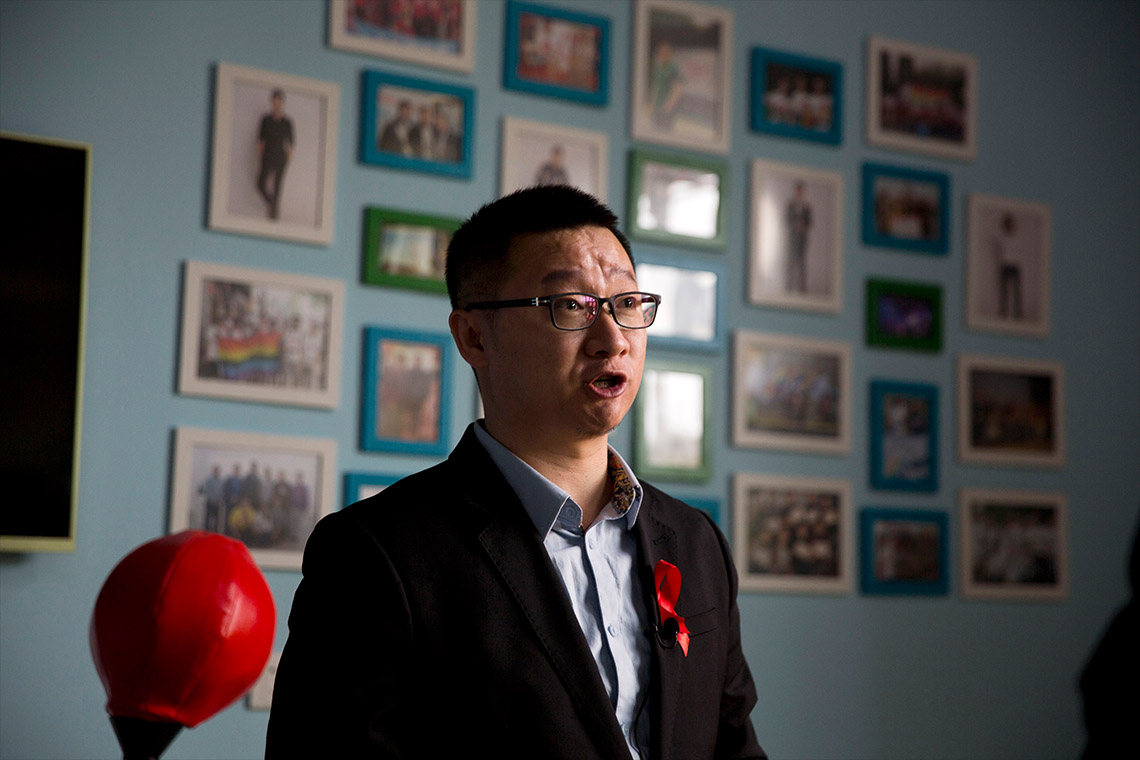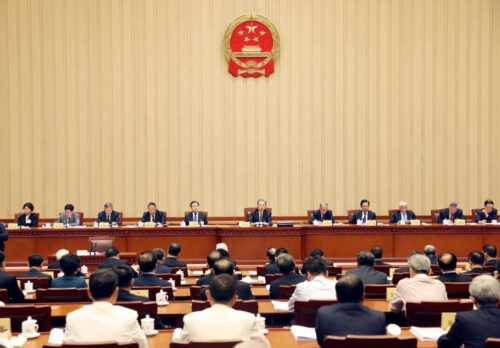A former policeman makes millions from a gay dating app, and China seizes an American underwater drone
Top China news for December 16, 2016. Get this daily digest delivered to your inbox by signing up at supchina.com/subscribe.

TODAY’S TOP STORIES
An app for China’s pink economy
The New York Times has published a profile of Ma Baoli, a police officer in northern China “with a wife and a knack for street chases,” who spent his nights “furtively running a website for gay people across China at a time when many were viewed as criminals and deviants.” When his police superiors found out about the website, he resigned and created Blued, a popular gay dating app that has “an estimated value of $600 million and more than three million active daily users,” according to the Times.
If you’re interested in this topic, the Sinica Podcast interviewed Chinese gay activist and filmmaker Fan Popo in 2014, and you can read a story on The China Project about gay men from China finding “a liberating openness in America’s LGBT community.”
South China Sea watch: China seizes an American underwater drone
Tensions continue to ratchet up in the South China Sea. Yesterday, we noted the release of a series of photos that appear to show weapons systems installed on artificial islands built up by China and the Chinese government’s response. Today, Reuters reports that “a Chinese Navy warship has seized an underwater drone deployed by an American oceanographic vessel in international waters in the South China Sea, triggering a formal demarche from the United States and a demand for its return.”
China is no longer the biggest holder of U.S. debt
Among the revelations in the trove of American diplomatic cables published by WikiLeaks in 2010 was Hillary Clinton’s memorable question about U.S.-China relations: “How do you deal toughly with your banker?” Worries about China’s vast holdings of American debt have been regularly featured in debates about both countries’ economies since 2008, when China took the top spot. Today, CNN writes that “China’s huge holdings of U.S. debt fell to $1.12 trillion at the end of October, their lowest level in more than six years…Japan held $1.13 trillion.” China has been selling off U.S. Treasuries in order to purchase the yuan, which has fallen to an eight-year low.
Chinese scientists implant 3D-printed blood vessels into monkeys
The Financial Times states that a Sichuan-based company has successfully transplanted artificial blood vessels created with a 3D printer into rhesus monkeys. The article quotes a noted surgeon and medical researcher who calls the development “groundbreaking work that will change the way regenerative medicine will develop,” and says that the Chinese scientists are “well ahead of the West.” You can see videos and photographs about the production and transplant procedures at 3ders.org.
Government economic pledges for 2017
Today’s Chinese central state media is dominated by reports on the Central Economic Work Conference attended by President Xi Jinping and Premier Li Keqiang. There are no surprises: The conference issued a statement that says that “China will stick to proactive fiscal and prudent monetary policies in 2017.” The government intends to “keep the yuan basically stable, while improving the flexibility of exchange rates,” and “take substantial steps toward mixed-ownership in the sectors of electricity, oil, natural gas, railway, civil aviation, telecommunications and military industries.” The statement also repeats recent calls from the government to attract more foreign investment.
This week on The China Project
In case you missed them, this week on The China Project we published the following: remarks from Henry Kissinger on China-U.S. relations in the age of Trump; a Sinica Podcast with author John Pomfret on the history of the two countries’ ties; a piece by David Bandurski on the horrible consequences for Chinese editors who publish typos in politically sensitive articles; and a Q&A with the editor of the New England Journal of Medicine on its new Chinese publication. You can also find all our previous daily newsletters on our website.
Coming up next week: a Q&A with concert pianist virtuoso Li Yundi, a roundup of the most important China news of 2016, and much more.
Other China stories worth your time are summarized and linked below, with the more important items at the top of each section.
BUSINESS AND TECHNOLOGY:
-
- Stranger things are going into China’s overseas shopping basket / Bloomberg
“More than 360 Chinese companies announced their first cross-border acquisitions in the initial 11 months of this year, with the combined size of the transactions more than doubling from the full year 2015,” Bloomberg reports. As more companies look to branch out into areas outside of their core businesses, authorities have started to heighten their scrutiny and are emphasizing avoidance of “irrational” deals. - U.S. adds new front in trade battle with China / Financial Times
“The latest U.S. case is focused on China’s administration of import quotas for corn, rice and wheat, which Washington claims unfairly limit its exports to China,” writes Shawn Donnan. “It is the 15th WTO action by the Obama administration against Beijing.” - China yuan weakness prompts support measures / CNBC
The People’s Bank of China set the mid-point rate for the yuan at 6.9508 per dollar Friday, the lowest since May 2008, as “heavy capital outflows and a hawkish Federal Reserve raise currency pressures in the world’s second-largest economy that the government says are manageable.” Meanwhile, a series of charts produced by The Wall Street Journal shows that costs to borrow the yuan outside of China throughout the year were unpredictable compared with the U.S. short-term borrowing rates. - China bonds in worst week in two years as Fed adds to stresses / Bloomberg
“Given capital outflows, the overall liquidity in the domestic market is volatile,” said one analyst. “It depends on how the People’s Bank of China will manage this, but the overall trend won’t change dramatically because we’re near year-end and it really depends on yuan depreciation.” - China plans prudent, neutral monetary policy for next year / Bloomberg
“Threats ahead of a crucial party congress late next year still loom, such as soaring debt and risk of confrontation with U.S. President-elect Donald Trump over trade and Taiwan,” Bloomberg reports. “Another challenge will be the Federal Reserve, which raised interest rates Wednesday for the first time this year and forecast a steeper path for 2017 increases.” - China bars banks from funding coal, steel ‘zombie firms’ / Reuters
“China’s banking regulator said on Friday that banks must strictly control credit to coal and steel firms that are violating capacity cuts, the latest in a series of regulations aimed at reducing loans to industries struggling with overcapacity.” - Apple, Spotify face upstart rival in streaming music: China’s Tencent / WSJ
“The Shenzhen-based company, the world’s biggest video game publisher by revenue, is increasing the reach of its Joox music-streaming service in Southeast Asia and is exploring plans to enter the Indian market.” - Tencent: Inside China’s ‘killer app’ factory / Financial Times
In addition to WeChat, an app that counts 846 million active monthly subscribers, “Tencent also has a huge multibillion investment portfolio, ranging from stakes in Didi Chuxing, China’s biggest ride-sharing company, through to startups,” writes Louise Lucas. “It dabbles in artificial intelligence, electric cars and bike sharing. Its posse of champion hackers managed to gain remote control of Tesla’s Model S, forcing the U.S. carmaker to roll out a security patch.”
- Stranger things are going into China’s overseas shopping basket / Bloomberg
POLITICS AND CURRENT AFFAIRS:
-
- China live-fires aircraft carrier group amid Taiwan tensions with U.S. / The Guardian
“China’s first and only aircraft carrier led large-scale exercises in the Bohai Sea, the navy of the People’s Liberation Army announced late on Thursday. The drills involved dozens of ships and aircraft in the carrier group and more than 10 air-to-air, anti-ship and air defense missiles were tested.” - Opinion: China invents the digital totalitarian state / The Economist
With the development of a social credit rating system, “the government is creating the capacity for a long-tentacled regime of social control,” writes the author. “Many of the elements are ready: the databases; the digital surveillance; the system of reward and punishment; and the we-know-best paternalism. What remains is to join the pieces together.” - China takes action on thousands of websites for ‘harmful,’ obscene content / Reuters
The government office for combating pornography and illegal publications announced that 2,500 websites and more than 3 million posts had been “dealt with” for spreading “harmful” content in the months between April and December, part of a drive to protect young people and “purify” the internet. - When China bullies its neighbors, India gets more muscular / Quartz
“China’s increasingly rough-handed and assertive foreign policy toward its neighbors is raising India’s diplomatic and economic clout in the region,” writes Ilaria Maria Sala. “In recent weeks, Mongolia and Vietnam have provided striking examples of India’s new assertiveness.”
- China live-fires aircraft carrier group amid Taiwan tensions with U.S. / The Guardian
SOCIETY AND CULTURE:
-
- Don’t call it ‘smog’ in Beijing, call it a ‘meteorological disaster’ / NYT
“With officials poised to legally classify smog as a natural disaster by including it in the Beijing Municipal Meteorological Disaster Prevention Statute, not everyone is happy,” writes Didi Kirsten Tatlow. “Some are concerned that classifying the murky air as a natural disaster will reduce pressure on officials to fix the problem.” - China wants 23 northern cities put on red alert for smog / Reuters
“Officials in Beijing issued a red alert on Thursday after the Ministry of Environmental Protection (MEP) warned of a smog buildup across China’s north, saying the alert was expected to run until December 21.” - China has made strides in addressing air pollution, environmentalist says / NYT
Ma Jun, director of the Institute of Public and Environmental Affairs, says that “China has entered an era when air quality information is released. It’s much more transparent. We see huge progress in tracking pollution sources.” - Xi Jinping likes English beer, Russian ice cream and Iowa farms — and now all of China does, too / WSJ
“As China’s president tries to cultivate a common touch, investors and tourists are retracing his steps.” - ‘The Great Wall’ review — Matt Damon epic delivers spectacle but not soul / The Guardian
“Zhang Yimou’s artful flourishes are the highlights of this U.S.-Chinese blockbuster, a monster movie with a muddled message — but plenty of sweeping swordplay,” writes Helen Roxburgh. - Chinese and Western culture to meet in a film about ‘Vinegar Joe’ Stilwell / Deadline Hollywood
The polarizing character of General Joseph Stilwell “may be just the figure to fill theater seats in both the United States and China,” writes Michael Cieply, “or so goes the thinking behind a new film project being backed by China’s Pegasus Media Group in partnership with the Hollywood producers Michael Shamberg and Alan Greisman.” - Chinese who first glimpsed American culture through Alan Thicke mourn his death / LA Times
“Growing Pains, the three-decade-old family sitcom starring Thicke, gave millions of Chinese their initial taste of American culture as the country emerged from decades of isolation and began to engage with the world.”
- Don’t call it ‘smog’ in Beijing, call it a ‘meteorological disaster’ / NYT





